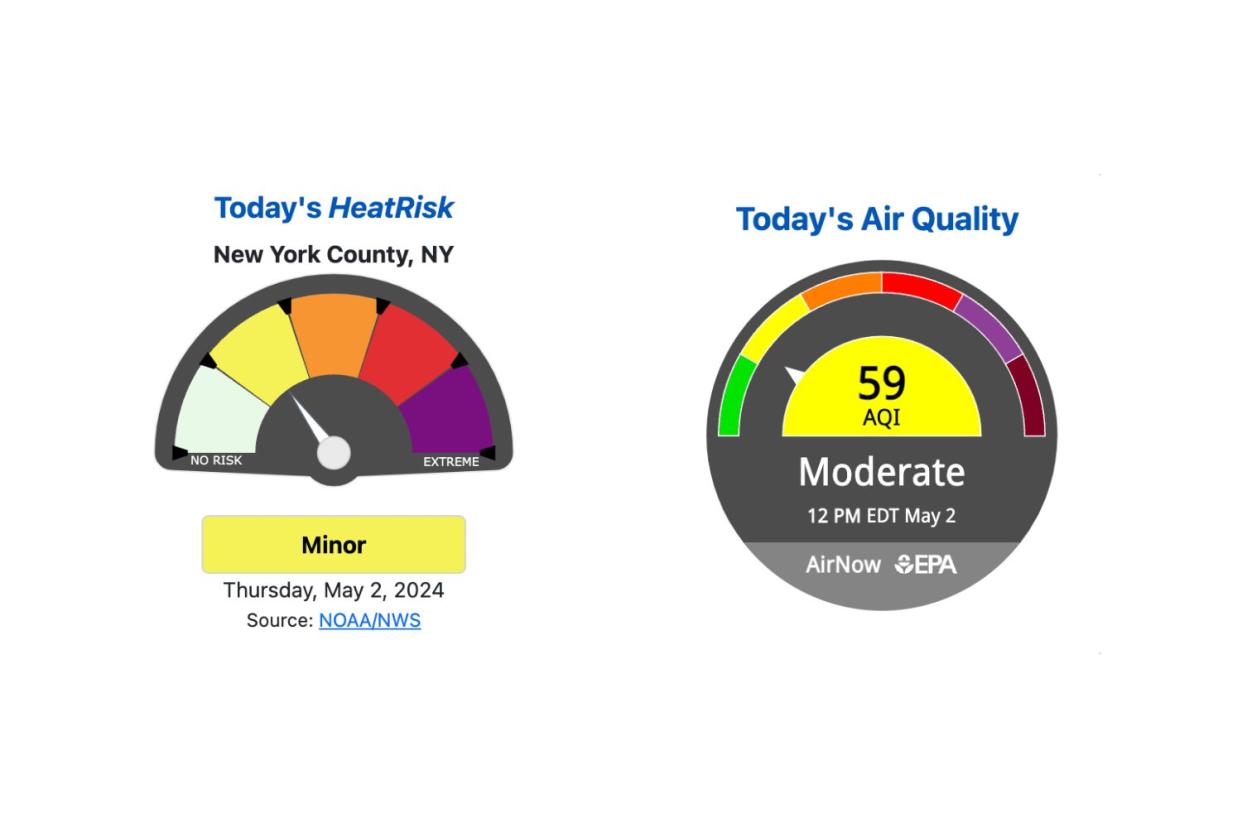A Free New Tool Can Help You Assess Heat and Air Quality Risks This Summer

Centers for Disease Control and Prevention
Fact checked by Nick Blackmer
Key Takeaways
The CDC released a HeatRisk tool to help people monitor air quality and heat risk.
Extreme heat can exacerbate chronic conditions like asthma, heart disease, and psychiatric disease.
During extreme heat events and poor air quality, experts recommend staying indoors in a cool space and closing the windows to prevent pollutants and pollen from entering the home.
The Centers for Disease Control and Prevention (CDC) recently launched a new tool to protect people from the health risks of ever-increasing temperatures. In 2023, there were 119,605 emergency room visits related to heat, 92% of which occurred between May and September.
The free tool, called the HeatRisk Dashboard, is designed to inform users about heat and air quality based on their location and to provide tips to protect them from extreme heat.
“It allows people to access important heat and health information in an easy-to-use, intuitive, mobile-friendly interface,” a CDC representative told Verywell. Users can access the tool on the CDC website.
The tool is further supported by the Environmental Protection Agency (EPA) AirNow Air Quality Index, which provides information on local air quality and the presence of pollutants.
How to Use the HeatRisk Dashboard
To use the dashboard, you’ll need to enter your zip code. Based on your geographic location, the tool will deliver personalized heat forecast information with indoor and outdoor protective actions to take, such as staying hydrated and cool.
Pulled from a forecasting tool, the tool relays your heat risk via a meter, ranging from no risk to extreme.
Information about air quality follows the information about heat risk. The air quality index (AQI) measures five major air pollutants regulated by the Clean Air Act: ground-level ozone, particle pollution, carbon monoxide, sulfur dioxide, and nitrogen dioxide.
Related: What Can the Air Quality Index Tell You?
According to the EPA, the air quality index functions as a yardstick, running between 0 and 500. If AQI falls between 0 and 50, air quality is considered good with little to no risk.
The higher the AQI values, the more risk it poses to people who are sensitive to air pollution. AQI values that reach or exceed 300 are considered hazardous and pose a danger to human health.
“Extreme heat can directly affect human health by causing heat cramps, heat exhaustion, heat stroke, and hyperthermia,” Amanda Dilger, MD, instructor of otolaryngology at Harvard Medical School and a surgeon at Mass Eye and Ear, told Verywell. “Most commonly, extreme heat exacerbates chronic conditions including respiratory disease like asthma, heart disease, and psychiatric disease.”
Children, pregnant people, older adults, and people who work outdoors are also susceptible to extreme heat, she added.
Related: Air Quality Is Improving Nationwide, but One Type of Harmful Pollution Remains a Threat
Indoor Air Quality Matters, Too
While it can be tempting to open doors and windows for ventilation, experts advise against doing so during extreme heat events and when air quality is poor. That’s because there’s an increase in pollutants and pollen.
Because mold and dampness can trigger allergic reactions and asthma symptoms, it’s also important to monitor indoor humidity levels to keep mold at bay.
To prevent mold growth, Dilger recommends using dehumidifiers to keep humidity levels between 30% and 50%, as well as keeping air conditioning units and air ducts clean.
Related: The 12 Best Air Purifiers for Allergies of 2024
What to Do During an Extreme Heat Event
When heat levels are considered extreme, Dilger said it’s important to stay indoors with air conditioning if you can.
If you don’t have air conditioning, the CDC recommends locating a cooling center near you.
“Even a few hours in a cool location can lower your risk for health impacts from heat,” said the CDC representative. “Fans may not cool you off when it is this hot outside.”
In addition to staying inside, Dilger recommends:
Limiting outdoor activity, especially during midday
Drinking plenty of fluids
Wearing loose-fitted and lightweight clothes
Checking on family, friends, and neighbors, especially those who live alone or have limited social support
What This Means For You
If you have a chronic condition or are susceptible to pollutants and extreme heat, experts recommend staying indoors, watching for humidity levels, and staying hydrated. If you don’t have air conditioning, you can locate a cooling center near you.
Read the original article on Verywell Health.

